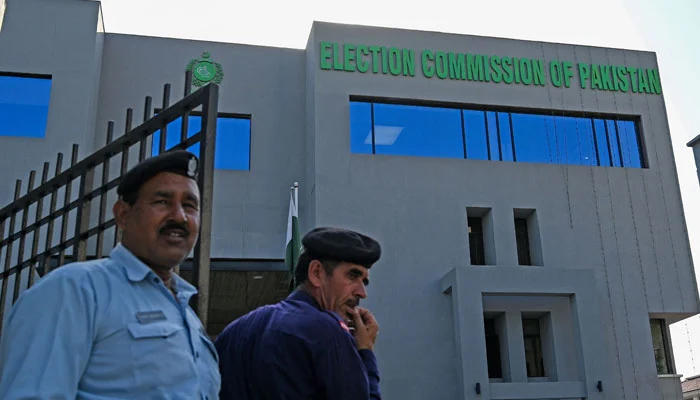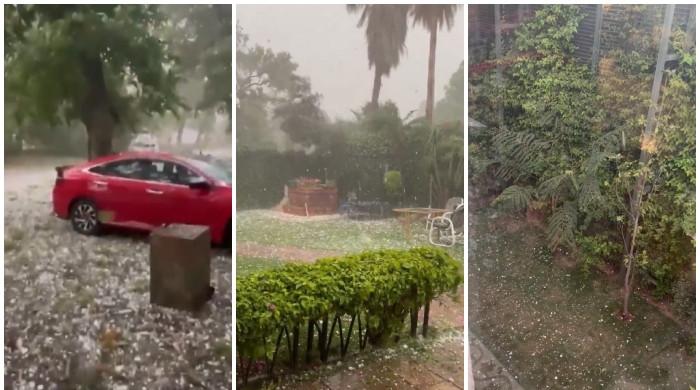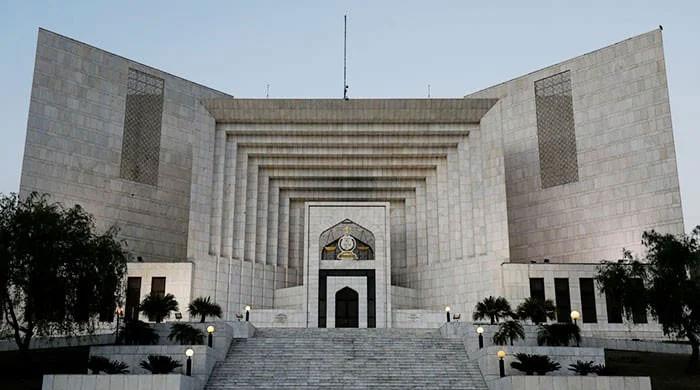In major blow, ECP rules against allocating reserved seats to PTI-backed SIC
PTI announces challenging ECP's verdict in court, demands electoral body to postpone presidential, Senate elections
March 04, 2024

- PTI announces challenging ECP's verdict in court.
- Remaining seats to be given to other political parties.
- ECP announces split verdict with 4-1 majority.
ISLAMABAD: The Election Commission of Pakistan (ECP) Monday ruled that Pakistan Tehreek-e-Insaf (PTI)-backed Sunni Ittehad Council (SIC) is not eligible for the reserved seats allotted to women and minorities, serving a major blow to the already embattled party.
The commission’s five-member bench — headed by Chief Election Commissioner Sikandar Sultan Raja — announced the split decision with a 4-1 majority.
ECP Punjab member Hassan Bharwana dissented with the majority verdict, which was reserved on February 28. The remaining 77 reserved seats will now be allotted to other political parties.
In the verdict, the ECP said it extended the deadline to submit a priority list for the reserved seats of women, and the SIC, before the February 8 polls, did not submit the required list which was "mandatory".
The electoral body said the SIC cannot claim the share in the reserved seats for the women “due to non-curable procedural and legal defects and violations of mandatory provisions of the Constitution”.
The ECP verdict cited Article 51(6), saying the article clearly stated the reserved seats would be allocated to the political parties who contested elections and won general seats based on a “proportional representation system”.
It further stated that the percentum share of each political party shall be worked out with reference to the total number of general seats in the National Assembly and the provincial assembly.
“The same formula is provided for the reserved seats for non-Muslims.”
While rejecting the plea of SIC, the ECP accepted applications of the opposing parties and decided that the seats in the National Assembly would not remain vacant and be allocated by a proportional representation process of political parties on the basis of seats won by political parties.
“[The] Office is directed to calculate the quota accordingly,” read the verdict.
The ECP had reserved the verdict on the petitions filed by the SIC seeking the allocation of women and minority seats after PTI-backed winning candidates joined its ranks following the February 8 elections.
The PTI-backed independent candidates took the lead in the February 8 elections after they won the 92 National Assembly seats, followed by Pakistan Muslim League-Nawaz (PML-N) (79) and the Pakistan Peoples Party (PPP) (54).
The reserved seats were awarded to all political parties as per their strength in the assemblies, except the PTI-backed SIC.
How many seats has PTI-backed SIC lost?
- National Assembly — 23 seats (20 women and 3 minorities)
- Khyber Pakhtunkhwa Assembly — 25 seats (21 women and 4 minorities)
- Sindh Assembly — 2 seats (women)
- Punjab Assembly — 27 seats (24 women and 3 minority seats)
- Total — 77 seats
PTI vows to challenge verdict in court
Speaking to the media, PTI leader Shoaib Shaheen said his party will challenge the ECP's verdict in the court. "Neither the ECP's intention is clean nor its decision," he said adding that the party hoped that it would get justice from the high court.
However, Shaheen said the PTI also reserved the right to approach the Supreme Court if it did not get relief from the high court.
Similarly, PTI Senator Ali Zafar also criticised the ECP's decision, saying the National Assembly consists of 336 seats — including reserved seats for women, minorities, and general seats.
Addressing the Senate session, the PTI senator said the lawmakers have to elect the president, senators, deputy speaker and speaker, and chief ministers of their respective Houses.
"Unless these assemblies are completed, elections cannot be held for these constitutional positions. The upcoming elections include the president’s and Senate. However, an incomplete house cannot vote for the president," he maintained.
Similarly, the PTI senator said if the provincial assemblies are incomplete, then the polls for senators cannot be held. "This is a very clear point that we raised when we went to the ECP with the petition on behalf of the SIC."
"Article 51 (6)(d) states that a party would be provided seats proportionally to the seats that they have won in the election. If an independent also joins the party after the polls, they will be considered as members of that party," he added.
Senator Zafar also demanded the top officials of the Election Commission to step down and postpone the upcoming president and Senate elections.
Dissenting note
In the dissenting note, ECP Punjab chapter member Bharwana said he partially agreed with the majority verdict that the reserved seats cannot be allocated to SIC, as priority list was not submitted in time.
"However, I have dissenting views with regard to allocation of seats by way of Proportional representation to the other Political Parties."
"In my opinion Article 51(6-d), and Article 106(3-c) of the Constitution clearly states that reserved seats will be allocated to the Political Parties on the basis of total number of General Seats secured by each Political Party from the Province concerned in the National Assembly or such reserved seats secured by each Political Party in the Provincial Assembly."
The ECP member maintained that these seats will remain vacant till the time any such amendment in Articles 51 and 106 of the Constitution is made by the Parliament.











